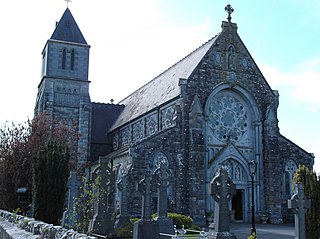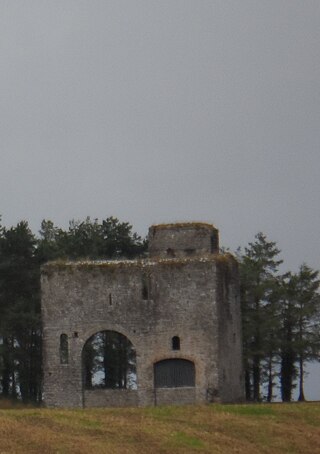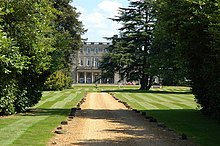The Lord High Chancellor of Ireland was the highest judicial office in Ireland until the establishment of the Irish Free State in 1922. From 1721 to 1801, it was also the highest political office of the Irish Parliament: the Chancellor was Speaker of the Irish House of Lords. The Lord Chancellor was also Lord Keeper of the Great Seal of Ireland. In all three respects, the office mirrored the Lord High Chancellor of Great Britain.
Fromund le Brun was a cleric and judge in thirteenth-century Ireland who became Lord Chancellor of Ireland. He lost a long battle to become Archbishop of Dublin, due largely to his notorious pluralism. He also clashed bitterly with the formidable Archbishop of Cashel, David Mac Cerbaill, who excommunicated him.

Alexander de Balscot, also known as Alexander Petit was one of the leading Irish clerics of the late fourteenth century, who held the offices of Bishop of Ossory, Bishop of Meath, Treasurer of Ireland and Lord Chancellor of Ireland.

Thomas Cantock, Quantock or Cantok was an English-born cleric and judge in medieval Ireland, who held the offices of Bishop of Emly and Lord Chancellor of Ireland.
William Tany or Tani was Prior of the Order of Hospitallers in Ireland; he also served as Justiciar of Ireland 1373-1374, and as Lord Chancellor of Ireland from 1374 to 1377, and again from 1382 to 1384.
Roger Utlagh, or Roger Outlawe was a leading Irish cleric, judge and statesman of the fourteenth century who was Prior of Kilmainham, and held the office of Lord Chancellor of Ireland. He was the brother-in-law of the celebrated Witch of Kilkenny, Alice Kyteler, and is mainly remembered today for his efforts to shield her from prosecution, and subsequently enabling her to escape punishment, during the Kilkenny Witch Trials of 1324.
Sir John Morice, Morris or Moriz was an English-born statesman of the fourteenth century whose career was mainly spent in Ireland. He is remembered chiefly for his enthusiastic, if not very successful, efforts to reform the Irish administration, and for the fact that a portrait of him still exists. This is said to be the earliest portrait of an Irish judge, and can be viewed by the public.
Walter de Thornbury was an English-born statesman and cleric in 14th century Ireland who held the office of Lord Chancellor of Ireland. His efforts to secure confirmation of his election as Archbishop of Dublin were cut short by his death in a shipwreck.

Richard Wogan was an Irish judge and cleric who held the office of Lord Chancellor of Ireland, and also served as a soldier.
John Frowyk was an English-born cleric and judge in fourteenth-century Ireland.
Thomas Le Boteller, or Thomas Butler, nicknamed Thomas Bacach i.e. Thomas the Lame, was the illegitimate son of the 3rd Earl of Ormond, and a leading political figure in early fifteenth-century Ireland. He held the offices of Lord Chancellor of Ireland, Lord Deputy of Ireland and Prior of Kilmainham. In his own lifetime, he was a highly unpopular statesman, who was accused by his numerous enemies of treason. He is now chiefly remembered as a professional soldier, who was present at the Siege of Rouen in 1418–19. He had previously fought in the sanguinary conflict known as the Battle of Bloody Bank near Dublin in 1402.
Robert de Emeldon, or Embleton was an English-born Crown official and judge who spent much of his career in Ireland. He held several important public offices, including Attorney-General for Ireland, Lord High Treasurer of Ireland and Chief Baron of the Irish Exchequer. He was a turbulent and violent man, who was guilty of at least one homicide, was imprisoned for a number of serious crimes including rape and manslaughter, and had a reputation for corruption: but he was a royal favourite of King Edward III and was thus able to survive his temporary disgrace in the early 1350s.
Robert de Holywood was an Irish judge and landowner who held the office of Chief Baron of the Irish Exchequer. He was the ancestor of the Holywood family of Artane Castle, and of the St. Lawrence family, Earls of Howth. He was a substantial landowner with property in Dublin, Meath and Louth. He became extremely unpopular, and was removed from office after numerous complaints of "oppression and extortion" were made against him. These were apparently inspired ĺargely by his close association in the mid-1370s with Sir William de Windsor, the embattled Lord Lieutenant of Ireland.
Sir Thomas de Rokeby was a soldier and senior Crown official in fourteenth-century England and Ireland, who served as Justiciar of Ireland. He was appointed to that office to restore law and order to Ireland, and had considerable early success in this task, but he was recalled to England after the military situation deteriorated. He was later re-appointed Justiciar, and returned to Ireland to take up office, but died soon afterwards.
Robert Preston, 1st Baron Gormanston was an Anglo-Irish nobleman, statesman and judge of the fourteenth century. He held several senior judicial offices including, for a brief period, that of Lord Chancellor of Ireland. He was the founder of the leading Anglo-Irish Preston family whose titles included Viscount Gormanston and Viscount Tara.
Hugh Canoun, or Hugh Canon was an English-born judge in early fourteenth-century Ireland. He was a justice of the Court of Common Pleas (Ireland) and served as Deputy Justiciar of Ireland. As a judge he was praised for his good and faithful service to the English Crown, and as a lawyer he was known as "a man very knowledgeable about all the King's business". On the other hand, his loyalty to the Crown during the Scottish Invasion of Ireland in 1315-18 was said to be extremely doubtful, although he was saved from disgrace by his influential connections. He was murdered by Andrew de Bermingham of Athenry in 1317/18, during the last months of the Bruce Invasion, in the course of a private feud, of which little is known.

Sir William de Essendon, de Estdene or Eastdean was an English-born cleric, lawyer and Crown official, much of whose career was spent in Ireland in the reign of Edward I of England and his son. He served twice as Lord High Treasurer of Ireland, and had a high reputation for integrity and efficiency.
William fitz Roger was an Anglo-Norman cleric, judge and Crown official in late thirteenth-century Lordship of Ireland. He was Prior of the Irish House of the Knights Hospitallers at Kilmainham, and served as a Privy Councillor and as a justice in eyre. He led several military expeditions, but was a notoriously incompetent commander, whose campaigns invariably ended in failure. He served as Deputy Justiciar in 1284-5, and as acting Justiciar of Ireland in 1294.

John Brettan or Breton was an Irish judge and Crown official. His petitions to the Irish Privy Council, of which he wrote five between 1376 and 1382, and which have survived ; cast a valuable light on the disturbed condition of English-ruled Ireland in the late fourteenth century, and especially the situation in Carlow, his home town, which was the effective seat of English government in the latter half of the fourteenth century.

William de Epworth was an English-born judge and Crown official in Ireland in the reign of King Edward III. His career was marked by conflict with two other judges, Nicholas de Snyterby and John de Troye, who contested his right to sit as a Baron of the Court of Exchequer (Ireland). He also faced allegations of corruption in his conduct in another non-judicial office, which was taken very seriously, but of which he was ultimately cleared.






